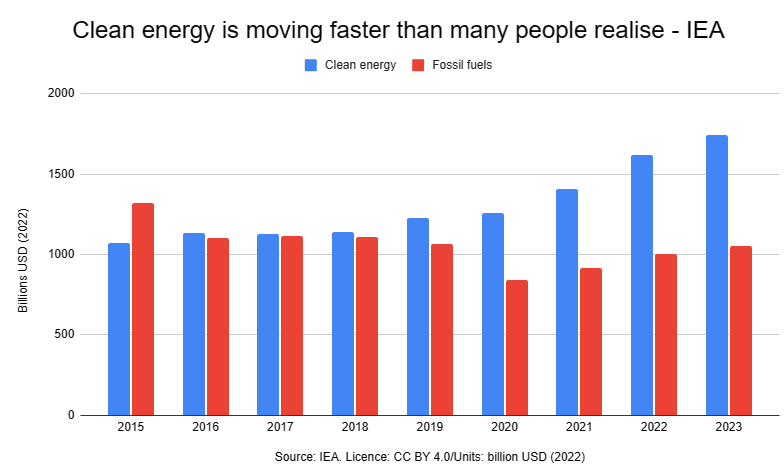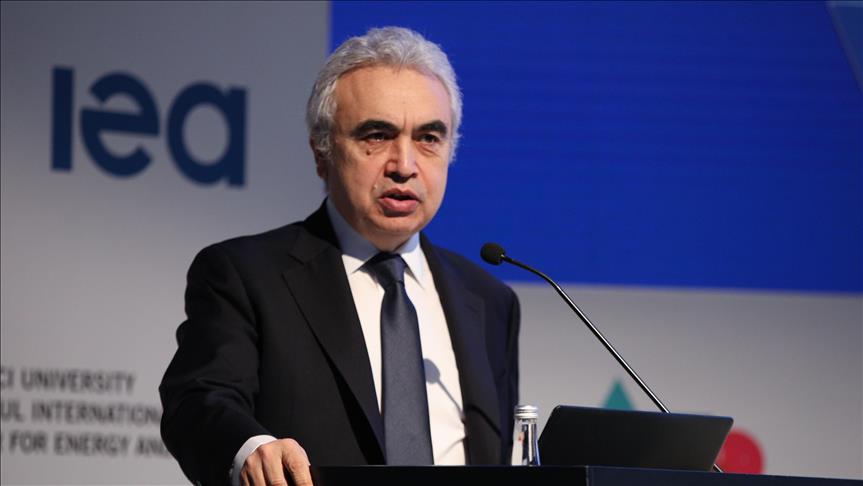Clean energy investments are projected to surpass fossil fuels by more than 50% this year, signaling a significant milestone in the transition to a sustainable energy landscape. According to a recent report by the International Energy Agency (IEA), global investment in clean energy technologies is outpacing spending on fossil fuels, driven by concerns over affordability and security triggered by the global energy crisis.
The IEA’s World Energy Investment report revealed that out of the anticipated US$2.8 trillion global energy investment in 2023, more than US$1.7 trillion is expected to be directed towards clean technologies, including renewables, electric vehicles, nuclear power, grids, storage, low-emissions fuels, efficiency improvements, and heat pumps. In contrast, slightly over US$1 trillion will be allocated to coal, gas, and oil.

Between 2021 and 2023, annual clean energy investment is projected to increase by 24%, with renewables and electric vehicles driving this growth. In comparison, fossil fuel investment is expected to rise by 15% during the same period. However, the report warns that over 90% of the increase in clean energy investment is concentrated in advanced economies and China, raising concerns about potential divisions in global energy dynamics if other regions do not accelerate their clean energy transitions.
IEA Executive Director Fatih Birol stated, “Clean energy is moving fast – faster than many people realise. This is clear in the investment trends, where clean technologies are pulling away from fossil fuels.” Birol pointed to solar energy as a prime example, as it is set to overtake investment in oil production for the first time.
Is Guyana ready to go electric? | OilNOW
The IEA report also highlighted that low-emissions electricity technologies, led by solar power, are expected to account for nearly 90% of investment in power generation. Furthermore, consumers are increasingly investing in electrified end-uses, with global heat pump sales experiencing double-digit annual growth since 2021, and electric vehicle sales projected to surge by one-third this year following a substantial increase in 2022.
The growth of clean energy investments can be attributed to several factors, including robust economic growth, concerns about energy security, and enhanced policy support from governments worldwide. The IEA said major initiatives like the US Inflation Reduction Act and efforts in Europe, Japan, China, and other countries have contributed to the acceleration of the clean energy sector.
Guyana aims for 39MW of accumulated solar capacity in the next 3 years | OilNOW
However, the report also underscores a significant disparity in clean energy investment, particularly in emerging and developing economies. While countries like India, Brazil, and certain parts of the Middle East have shown promising investments in solar and renewables, others face obstacles such as high interest rates, unclear policy frameworks, weak grid infrastructure, financially strained utilities, and a high cost of capital. The IEA stressed the importance of international collaboration to encourage investment in lower-income economies, where the private sector has been hesitant to engage.
Despite the growth in clean energy investments, the report noted that spending on upstream oil and gas is expected to rebound by 7% in 2023, surpassing the levels needed to achieve the IEA’s Net Zero Emissions by 2050 Scenario. Additionally, global coal demand reached a record high in 2022, and coal investment this year is projected to be nearly six times higher than the levels envisioned for 2030 in the same scenario. The report also revealed that the oil and gas industry’s capital spending on low-emissions alternatives remains minimal, accounting for less than 5% of its upstream spending in 2022.




